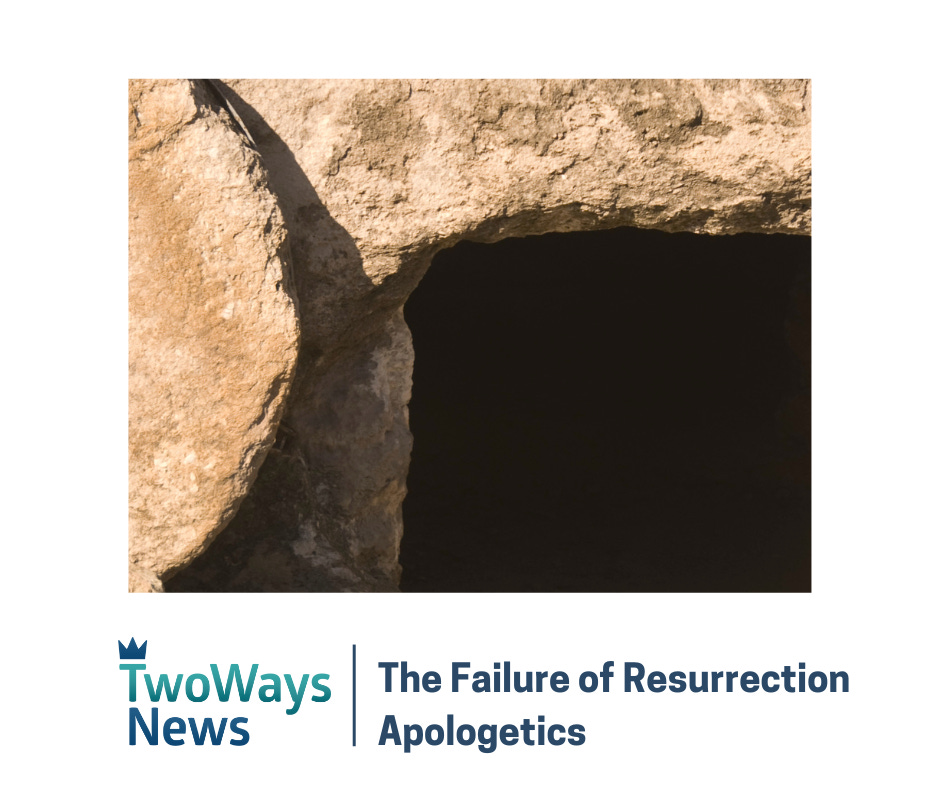Dear friends,
In this episode of Two Ways News, we’re looking at the resurrection both from a historical and a theological point of view. History and argumentation have great merit, and yet a defective presupposition that leaves us unsatisfied. Yet prophetic history not only satisfies our knowledge of historical events but also explains their meaning and purpose. Jesus said that without Moses and the prophets, people will not believe even if someone rises from the dead. This has been demonstrated over the centuries and in our age today. I hope you enjoy this episode. You can email us at respond@twm.email and one of our team will get back to you.
Yours,
Phillip
Phillip Jensen: Welcome to Two Ways News. Today, our topic is the resurrection. We cannot pass Easter without reflecting on the importance of the resurrection of the Lord Jesus.
If the resurrection is so obviously historical, why do some people simply not believe it?
Peter Jensen: There are various books written by an unbeliever who started to look at the history of the resurrection and became a believer, for example, Who Moved the Stone.1 At another level altogether, there's Tom Wright's great book of the resurrection.2 These are significant contributions at two different levels, both saying that this is real history. This really did happen. I've known ancient historians who have said exactly that.
Phillip: There's an interesting book with a Jewish perspective by Pinchas Lapide, written in the 1980s. He was a Jewish historian of Palestine. He disparages those who would attack the historicity of the resurrection. It is called The Resurrection of Jesus: A Jewish Perspective.3
Peter: However, I have to say that it depends a little bit on a presupposition here. The presupposition that we have been taught as historians is that miracles don't happen. You strive for some other explanation. It is an approach that I would myself favour in a way. However, it is a presupposition. I think it is a presupposition that comes, in one way, from the Protestant Reformation. But in another way, since the Enlightenment, it is ultimately based on an intellectual belief that there is no God. If you do believe there is a God, if you do believe this God is capable of raising the dead, then I think you can say the evidence for the resurrection is pretty strong and, in fact, very persuasive. That is how I see it myself, but I recognize that there are different approaches to history here.
But there is a more fundamental aspect. As the Bible teaches us and experience shows us, a great deal depends on the presuppositions of the human heart, the predispositions of the human heart to find in any explanation that does not involve the true God in phenomena that we come across. It is quite likely that a great deal of scepticism about the resurrection is based not so much on intellectualism, which is atheistic, but is based upon an unwillingness to face the truth. Because we know that if Jesus was raised from the dead, then that in itself, I won't say it proves Christianity, but it means that you have to study it very carefully.
Phillip: Go back to that first presupposition of history. Two presuppositions are operating: the historian's presupposition and the atheist's presupposition. The historian's is just a modus operandi. I'm going to study history with the assumption that there are no miracles. But I'm not making any statement as to whether there are or aren't miracles. I'm just saying, how do I explain what's happened without reference to God? The atheist says there is no God. Therefore, what we've studied in history is the truth. When, in fact, the historian is just using modus operandi, just as this is the way we operate. He can't say it is the truth that Jesus didn't rise from the dead because dead men don't rise. He can only say, “We as historians cannot make that conclusion because our discipline is restricted.”
It happens in several disciplines. Science is the same. Scientific understanding has the limitation that it has ruled out, by definition, any reference to the supernatural. It can't then subsequently deny the supernatural because it's a presupposition of how we will do science. The atheist then can use science to say, ‘There is no God,' but that's a false conclusion. It's the assumption.
Counselling is the same. Counselling services have presuppositions that my task is to help the person, without judgement, because once I bring judgement into the counselling situation, the person is no longer free to express what is truly on their heart. We have this affirmation of you and your suffering in whatever way you want to come, which is a good technique for counselling, but of course, in the end, it is amoral at best and immoral at worst. And so we've got to accept that there are good reasons for presuppositions that exclude supernaturalism. But you can't then suddenly sneak in atheism because that is the presupposition. Is that what you're saying about history?
Peter: Yes, I am, but with the acknowledgement that I have known very distinguished historians who have been open to the supernatural and who are willing, therefore, to say that such a thing as the resurrection did take place on the historical evidence.
Phillip: If you are studying what happened with the Bible open, then you can say what happened in the past. The prophet can look at the reign of King Uzziah and say, ‘This was evil.’ But the economist would say, ‘This is the richest of times.’ It's an expression of where you are starting from. But both may be true in their way.
Peter: Sometimes, the historian knows less about what happened than just a simple reader in all sorts of ways, because history is very limited. I am very happy with the accounts of the miraculous because I have this presupposition that there is a God who rules the world.
Phillip: There are alternative explanations of resurrection that I just want to make sure we are clear about. That is, a resurrection is not simply a resuscitation.
Peter: A resurrection comes from the idea of what God is ultimately planning to do when his kingdom comes and the new age dawns. Not just a resuscitation of all the dead, but resurrection of the whole and embodied with a new body, a transformed body.
It is a far more extraordinary event than simply a resuscitation from the dead; Jesus didn't go into a coma and then awaken from the coma and come forth. This was the intrusion of the age to come into the present age.
Phillip: Okay, so it's different to Lazarus.
Peter: Lazarus died at some point later on, and that was a resuscitation, if you like, although Lazarus was truly dead. But the resurrection of Jesus pushes the whole thing into a further class.
Phillip: I keep finding people who get confused between resurrection and reincarnation.
They are very, very different things. Incarnate means ‘made flesh.’ Reincarnation has got to be ‘made flesh again,’ and so the reincarnation theories have got to do that after I die. My soul will, in some fashion, continue and then be reborn into a different body. I will have a different incarnation. It may not be a human body. It can be into a bird, an elephant, or any form of flesh. It is generally part of Eastern mysticism that we go through a series of incarnations. Depending on how we've lived in this world, we will suffer karma. We will suffer retribution in the next incarnation, in which we will pay for the sins of the last incarnation. So, we become more and more spiritual in our incarnations or less and less spiritual in our incarnations.
But in the resurrection, I come back as me. I don't come back as somebody different. I come back as a human, not as some different animal. My dead body is the body that is raised. It happens once. It's not a repeated thing happening. It doesn't involve the separation of the spirit from the body. It's the one person who was born, body and soul, who is going to be raised, body and soul, for eternity. So, it's radically different to reincarnation. I'm afraid that when we talk about resurrection, people hear us talking about reincarnation.
Peter: One of the differences is the sort of circularity in reincarnation; you are incarnated again and again and again. In the Bible, there is one great historical narrative, the narrative of the kingdom of God, the creation, the fall, and then the coming of the kingdom. History is going in a straight line. It is going towards the coming of the kingdom of God and the new age, which God intends to bring in—a new heavens and new earth. So, it's not a circle; it's a straight line. The truly astonishing thing is that this kingdom of God, which is something to be looked for, has come. The king has come, and we're waiting for him to come again, and as a sign of this, he is resurrected. The new age has come.
Phillip: His resurrection is not a spiritual continuation. In Luke's gospel they thought they saw a ghost, and so he asked for a meal of fish so that he ate the fish in their presence to show that it was a physical resurrection, not just a spiritual continuation.
Peter: We read in 1 Corinthians 15 that there were Christians in Corinth who wanted to argue that resurrections were not needed. It wasn't that they didn't believe in life after death. Of course they believed in life after death, but they understood it as the release of the spirit from the body. If you were a good person, your spirit flew higher. If you were not so good, your spirit would be lower, and it may have even infested the earth and the spiritual, the ghosts, and so forth. The spirit world impacted the physical world and the beliefs of many people. But you did live after death, so why bother with this resurrection stuff? After all, bodies gave pain and suffering. Bodies let them down all the time, particularly in the ancient world and before the days of medicine. The body was not particularly a positive idea. So the Corinthians argued that the resurrection was more or less like a sign of what God had done, but the sign was that there was life after death. Paul truly gets stuck into them.
Phillip: It is a long chapter but a great chapter, and we can be thankful sometimes for heresies because of the truth that can be expounded as a result.
I want to underline what you're saying about that one direction that everything is moving in. We believe in the creation. We believe that the creation is good. God saw our bodies and said, “It is good.” And we must never see the creation itself as a bad thing. And so there was a first Adam as a man from the dust. Now we have the last Adam, the man from heaven. But what the resurrection shows is that Jesus was a man. We are saved by man. If he wasn't human, he could not have saved us. If he wasn't God, he could not have saved us. But the God who became man was the one who could save us. The resurrection shows that he is still a man. He continues as a man. It also shows the new creation, that just as the creation was good and right, God's plans for the future of the world have to do with a creation that transforms our body. How radically different this was to Greek thinking and to philosophies of that age. There's that lovely verse at the end of Philippians where we're going to have the body of the Lord Jesus Christ. It's Philippians 3:20-21
Our citizenship is in heaven, and from it we await a Saviour, the Lord Jesus Christ, who will transform our lowly body to be like his glorious body, by the power that enables him even to subject all things to himself.
You and I are bodies created by God, and our bodies, because of sin, are dying and ageing. Now, we are dying all the time, but we're going to be transformed into living bodies, glorious bodies, like the Lord Jesus Christ. This is part of the judgement.
In Luke 16, Jesus tells the parable of the rich man and the poor man. The poor man dies and goes to Abraham's bosom. The rich man goes into Hades, into suffering, and he calls out to Abraham and says, “I've got brothers at home; send the poor man back to warn my brothers,” and Abraham says, “They have Moses and the prophets; let them hear them.”
And he said, “No, Father Abraham, but if someone goes to them from the dead, they will repent.” Abraham said to him, “If they do not hear Moses and the prophets, neither will they be convinced if someone should rise from the dead.” So the resurrection is not a kind of proof of the existence of God or proof of the existence of the afterlife. The resurrection must be seen in the context of Moses and the prophets. If you know what the Old Testament is expecting, then the resurrection will make sense to you. But if you don't know that the resurrection is taught in the Old Testament, then the resurrection won't make sense to you. Books that use the resurrection as an apologetic for the existence of God seem to me to fail to follow Jesus' own teaching. What does the resurrection prove? When Paul is speaking to the Athenians, he comes to the great climax where he says, in Acts 17:30-31
The times of ignorance God overlooked, but now he commands all people everywhere to repent, because he has fixed a day on which he will judge the world in righteousness by a man whom he has appointed; and of this he has given assurance to all by raising him from the dead.
So the resurrection is the assurance of the judgement by a man who is Jesus, because the Old Testament speaks of the Son of Man who will be given all in the judgement in Daniel 7. The Old Testament, Daniel again, chapter 12, speaks of the judgement at the end of the world in terms of the resurrection. Or in Ezekiel 37, with the valley of dry bones coming back to life under the kingdom of David when the Messiah comes. Jesus, speaking of this in John 5:25-29 says
Truly, truly, I say to you, an hour is coming, and now is here, when the dead will hear the voice of the Son of God, and those who hear will live. For as the Father has life in himself, so he has granted the Son also to have life in himself. And he has given him authority to execute judgement, because he is the Son of Man. Do not marvel at this, for an hour is coming when all who are in the tombs will hear his voice and come out, those who have done good to the resurrection of life, and those who have done evil to the resurrection of judgement.
So the resurrection is about the judgement at the end of the world and the judge of the living and the dead, the one who is risen from the dead. So, the resurrection is a one-off historical part of the one trajectory story of God from creation to the new creation. But when we take the resurrection out of the biblical panorama, we distort and misunderstand it.
Peter: I agree with all that.
Phillip: Then, how on earth could these Corinthians claim to be Christians and not believe in the resurrection?
Peter: Paul talks about the way in which, in the interim, in the period before Jesus comes again as a resurrected man to judge the living and the dead, and he says it culminates with the defeat of the last enemy, death. For although you can have belief in spirits, they don't grapple with sin and death. The last enemy is death, and it is dealt with by the forgiveness of sins, but it's dealt with by the resurrection of the body, and that is something that Jesus does.
One of the weaknesses of sermons in our part of the world, my own included, is that we do focus on the cross, rightly; we do talk about the resurrection perhaps less frequently, but we don't talk about the period that then follows, the period we are living in. We don't talk about it Christologically. We don't talk about it in terms of Christ's ascension and his present rule. We need to explore that and the biblical teaching on those matters, perhaps more than we do, because Jesus Christ is Lord, and he is Lord of the living and the dead; he is Lord now.
After Christ had risen from the dead, left his disciples, and was seated at the right hand of God, Christ sent his Holy Spirit to the believers. A new age dawned at that point, too, of the new covenant and the Spirit of God coming. That is one of the great first acts of Christ in his role as the present king until all is accomplished and Christ hands his kingdom over to the Father. It means his role as the king of the human race, the Lord of the human race, the man who was our Lord, the last Adam, the man from heaven, as we hear him described, under whose rule we now live.
Phillip: Two other thoughts, just briefly. It's not that the Corinthians didn't believe in the resurrection of Jesus. They didn't believe in the resurrection. So in that regard, they were like the Sadducees who didn't believe in the resurrection. And I think some of our problems today are because we believe in the resurrection of Jesus, but we don't believe in the resurrection.
Secondly, at the end of Romans 4, “he was delivered up because of our trespass and raised because of our justification.” That is, by his death, we are justified. And so, because of our justification, he was raised from the dead. For if Jesus has not been raised from the dead, we're still in our sin, as Paul says in 1 Corinthians 15.
Finally, what you say about Pentecost is so important. I am afraid the term ‘Pentecostalism’ has meant we haven't looked at the glory that is in Pentecost.
I wrote a book called The Coming of the Holy Spirit,4 which is available from Matthias Media, and I hope you'll buy it, friends. (You can have it in the printed copy, you can have it in the electronic form, and I've even read it out loud so that you can get it as an audiobook, if you want to.) But the subtitle of the book is Why Jesus Sent His Spirit. The Day of Pentecost is about his resurrection. The Day of Pentecost is about him pouring out his spirit. Because, as Paul says of the Gospel in the opening of Romans, the Gospel of God is about the resurrection. The Gospel of God is about Jesus sending his Spirit.
Frank Morrison, Who Moved the Stone?: A Skeptic Looks at the Death and Resurrection of Christ (Faber & Faber, 1987)
Tom Wright, The Resurrection of the Son of God (SPCK Publishing, 2017)
Pinchas Lapide, The Resurrection of Jesus: A Jewish Perspective (SPCK, 1984)
Phillip D. Jensen, The Coming of the Holy Spirit - Why Jesus sent his Spirit into the World (Matthias Media, 2022)
Scripture quotations are from The ESV® Bible (The Holy Bible, English Standard Version®), copyright © 2001 by Crossway, a publishing ministry of Good News Publishers. Used by permission. All rights reserved.
Why not help support Two Ways News?
If you enjoy Two Ways News, why not lend us a hand? Consider joining our Supporters Club—friends who make it possible for us to keep producing this article/podcast.
To join the Supporters Club, follow the link below to the ‘subscribe’ page. You’ll see that there’s:
a number ‘paid options’. To join the Supporters Club take out one of the paid ‘subscription plans’ and know we are deeply grateful for your support!
also the free option (on the far right hand side)












